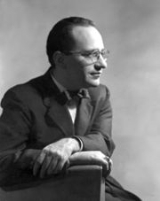
Murray Rothbard
Overview
Murray Newton Rothbard was an American author
and economist
of the Austrian School
who helped define capitalist libertarianism
and popularized a form of free-market anarchism he termed "anarcho-capitalism
." Rothbard wrote over twenty books and is considered a centrally important figure in the American libertarian movement.
Building on the Austrian School's concept of spontaneous order
, support for a free market
in money production
and condemnation of central planning, Rothbard advocated abolition of coercive
government control of society and the economy.
Author
An author is broadly defined as "the person who originates or gives existence to anything" and that authorship determines responsibility for what is created. Narrowly defined, an author is the originator of any written work.-Legal significance:...
and economist
Economics
Economics is the social science that analyzes the production, distribution, and consumption of goods and services. The term economics comes from the Ancient Greek from + , hence "rules of the house"...
of the Austrian School
Austrian School
The Austrian School of economics is a heterodox school of economic thought. It advocates methodological individualism in interpreting economic developments , the theory that money is non-neutral, the theory that the capital structure of economies consists of heterogeneous goods that have...
who helped define capitalist libertarianism
Libertarianism
Libertarianism, in the strictest sense, is the political philosophy that holds individual liberty as the basic moral principle of society. In the broadest sense, it is any political philosophy which approximates this view...
and popularized a form of free-market anarchism he termed "anarcho-capitalism
Anarcho-capitalism
Anarcho-capitalism is a libertarian and individualist anarchist political philosophy that advocates the elimination of the state in favour of individual sovereignty in a free market...
." Rothbard wrote over twenty books and is considered a centrally important figure in the American libertarian movement.
Building on the Austrian School's concept of spontaneous order
Spontaneous order
Spontaneous order, also known as "self-organization", is the spontaneous emergence of order out of seeming chaos. It is a process found in physical, biological, and social networks, as well as economics, though the term "self-organization" is more often used for physical and biological processes,...
, support for a free market
Free market
A free market is a competitive market where prices are determined by supply and demand. However, the term is also commonly used for markets in which economic intervention and regulation by the state is limited to tax collection, and enforcement of private ownership and contracts...
in money production
Money creation
In economics, money creation is the process by which the money supply of a country or a monetary region is increased due to some reason. There are two principal stages of money creation. First, the central bank introduces new money into the economy by purchasing financial assets or lending money...
and condemnation of central planning, Rothbard advocated abolition of coercive
Coercion
Coercion is the practice of forcing another party to behave in an involuntary manner by use of threats or intimidation or some other form of pressure or force. In law, coercion is codified as the duress crime. Such actions are used as leverage, to force the victim to act in the desired way...
government control of society and the economy.
Quotations
"The more consistently Austrian an economist is, the better a writer he will be."
![]()
"It is no crime to be ignorant of economics, which is, after all, a specialized discipline and one that most people consider to be a 'dismal science.' But it is totally irresponsible to have a loud and vociferous opinion on economic subjects while remaining in this state of ignorance."![]()
Making Economic Sense (1995)

